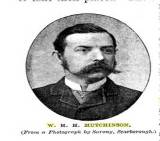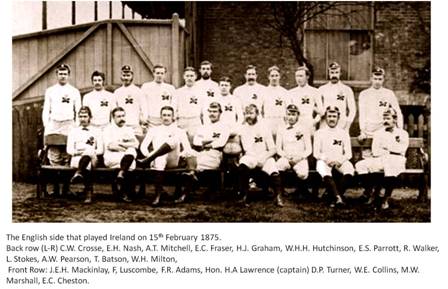

UP
William Henry Heap Hutchinson founder member of Hull FC.

The best known in the early days of Hull and Yorkshire football was W. H. H. Hutchinson, a fine strapping forward familiarly known to all his friends as the Baron, and was the first Yorkshire man to gain the distinction of being selected to play for England in 1875. He was considered a great authority on the game in his day and as a scrimmage he had certainly no superior. Hutchinson was the recognised captain of the Yorkshire team in matches played outside Yorkshire, the matches that were played within Yorkshire the captain was selected from the club the match was played at. Hutchinson retired from the captaincy of the Yorkshire team in 1876 another Hull FC great took over the captaincy for Yorkshire was the Great Gilbert Gilly Harrison.
In 1877 Hull was defeated in the Challenge Cup tie by York, and at the end of the season virtually broke up; almost all the old players, Hutchinson, the Hodgsons, Wade, Walter, Harrison and Moss and others dropped out, and there were very few young ones to take their places. The club continued under different management for three or four years longer, when it became amalgamated with the Hull White Star Club, and has since continued under its present management.
The following text is from the book Barbarians gentlemen and Players by Eric Dunning and Kenneth Sheard.
The first Hull Club was formed in the autumn of 1865 W. H. H. Hutchinson. C. B. Lambert. F. A. Scott, E. Waltham and H. J. Wade were among the founding members Hutchinson was head of the Scarborough firm. W. H. H. Hutchinson & Son, steamship owners and shipping commission and forwarding agents Lambert belonged to the firm of Lambert & Sons, wine and sprit merchants while Scott was a solicitor and partner in the firm of F.A. Scott and Coopers. Soon after its foundation, the club was joined by three Public School Old Boys L. A. Hollingbery, E. O. Moss of Rugby and E.W. Harrison of Cheltenham. However, it seems that Hull was an open Club from fairly early on, for in 1871 three artisans, William, Richard and Edward Hodgson were accepted as members. William and Richard worked as plumbers, glaziers and gas fitters, while Edward was described as a foreman.
It is clear, then, that the initial impetus to the playing of rugby in the North came from men who considered themselves gentlemen. However, they were in many cases gentlemen of lower social status than those responsible for the formation of clubs in the South. This can be seen from the higher proportion of club founders and players who worked in industry and trade, and the lower proportion employed in the professions or who had attended public schools. Exactly how Northern working men came to play rugby, often like the Hodgsons of Hull, in the same teams as gentlemen is not at present clear. Nicholson assumes that the process took the form of a gradual infiltration, with working men being pressed into service to make up the numbers in pre-dominantly middle-class teams.
Brook argues similarly, writing that in the North prior to the formation of the Northern Union, rugby had been played by all classes of men, all had been equal on the field whether the sons of mill-owners or factory hands in short. These authors presume the existence in the North of a social structure characterized by low barriers to class interaction and a relatively low degree of status-exclusiveness in patterns of inter-class association similar to that which had prevailed in the eighteenth century.
Although neither author produces evidence to support this supposition, there is reason to believe it to be partly valid, it is however, an oversimplification for it fails to treat as problematic the structural and motivational preconditions necessary for the growth of working-class support for rugby. This process is best considered in relation to the parallel process which occurred in soccer.


